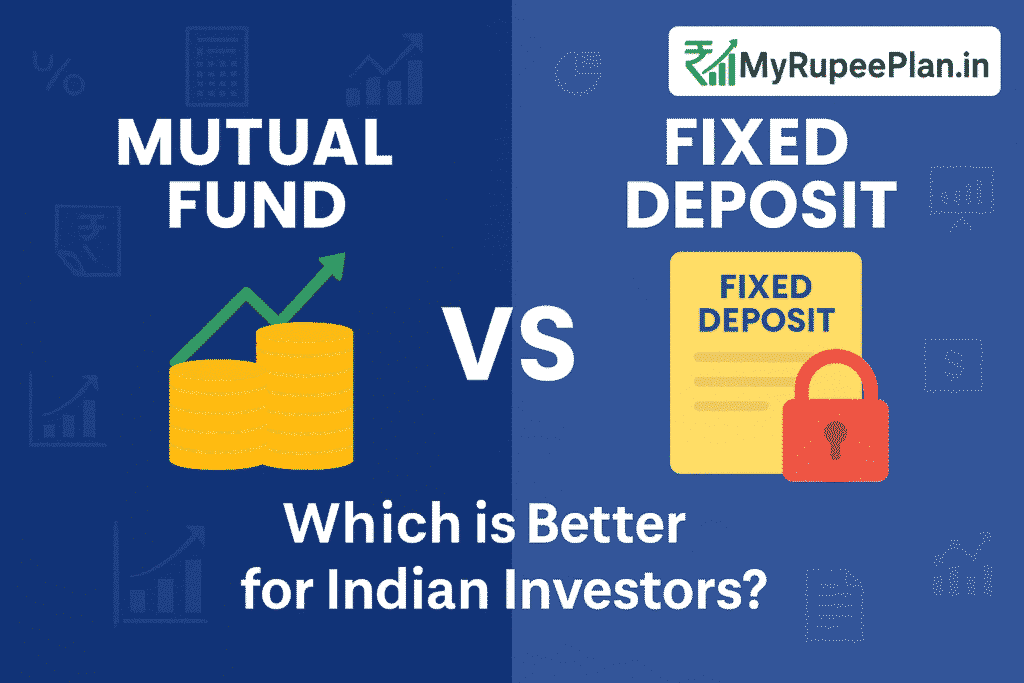Mutual Fund vs Fixed Deposit: Which is Better for Indian Investors?
Choosing between a mutual fund and a fixed deposit (FD) can be challenging for Indian investors. While FDs are safe and stable, mutual funds offer higher returns but come with market risks. In this detailed guide, we compare mutual funds and fixed deposits across various parameters, including returns, risk, taxation, liquidity, and suitability.

What is a Fixed Deposit (FD)?
A Fixed Deposit is a traditional investment product offered by banks and NBFCs where you deposit a lump sum amount for a fixed tenure and earn a guaranteed interest rate.
Key Features:
- Fixed interest rate
- Low to zero risk
- Suitable for short to medium-term goals
- Early withdrawal may lead to penalties
What is a Mutual Fund?
A Mutual Fund is a pool of money collected from various investors and managed by professional fund managers. These funds are invested in equities, debt, or a combination of both.
Types of Mutual Funds:
- Equity Mutual Funds
- Debt Mutual Funds
- Hybrid Funds
Case Study 1: FD vs Mutual Fund Returns
Scenario:
- Investment Amount: ₹5,00,000
- Tenure: 5 years
| Investment Option | Average Return (p.a.) | Maturity Amount | Tax Payable (approx.) | Post-Tax Return |
|---|---|---|---|---|
| Fixed Deposit | 6% | ₹6,73,000 | ₹20,000 | ₹6,53,000 |
| Mutual Fund | 12% (Equity MF) | ₹8,81,000 | ₹8,000 (LTCG) | ₹8,73,000 |
Insight: Mutual funds can offer higher post-tax returns if held long-term, although they carry risk.
Comparison Table: Mutual Fund vs Fixed Deposit
| Feature | Mutual Fund | Fixed Deposit |
|---|---|---|
| Risk | Moderate to High (market-linked) | Very Low (capital protected) |
| Returns | 8–15% (equity), 4–7% (debt) | 5–7% |
| Liquidity | High (except ELSS, exit load applies) | Medium (premature withdrawal penalty) |
| Taxation | LTCG/STCG based on holding period | Interest taxed as per slab |
| Investment Mode | SIP or Lump Sum | Lump Sum |
| Suitable For | Long-term wealth creation | Capital preservation |
Case Study 2: SIP vs FD
Scenario:
- Monthly SIP in Mutual Fund: ₹5,000
- FD Recurring Deposit: ₹5,000/month
- Tenure: 10 years
| Investment Option | Total Invested | Maturity Amount | Annualised Return |
|---|---|---|---|
| SIP (12%) | ₹6,00,000 | ₹11,61,695 | 12% |
| FD (6.5%) | ₹6,00,000 | ₹8,24,000 | 6.5% |
Result: SIP in equity mutual funds nearly doubles the corpus over 10 years compared to FDs.
Tax Implications
Fixed Deposit:
Mutual Funds:
- Equity Funds: LTCG above ₹1 lakh taxed at 10%; STCG at 15%
- Debt Funds: Taxed as per slab (if sold before 3 years)
When to Choose Mutual Funds?
- You are aiming for long-term wealth creation
- You are okay with market-linked volatility
- You want the flexibility of SIPs or diversification
When to Choose Fixed Deposits?
- You seek guaranteed returns and capital safety
- You’re investing for short-term goals
- You prefer stable and predictable income
Expert Opinion
“Mutual funds are ideal for wealth building, especially through SIPs. FDs are better for conservative investors or retirees seeking guaranteed income.” – Financial Planner at MyRupeePlan.in
Final Verdict: Which is Better?
| Investor Type | Recommended Option |
|---|---|
| Young investor (20s–30s) | Mutual Fund (SIP) |
| Retired senior citizen | Fixed Deposit |
| Risk-tolerant professional | Equity Mutual Fund |
| Short-term saver | Fixed Deposit or Debt MF |
Conclusion
Both mutual funds and fixed deposits have their place in a smart investment portfolio. Your decision should be based on your financial goals, risk tolerance, and investment horizon. Mutual funds offer superior returns with market risk, while FDs offer security and stable income.
Frequently Asked Questions (FAQs)
What is the key difference between mutual funds and fixed deposits?
Which is safer: FD or mutual fund?
Fixed deposits are safer as they offer capital protection. Mutual funds carry market risk.
Can I lose money in mutual funds?
Yes, especially in the short term due to market volatility. However, long-term investments generally yield positive returns.
Are mutual funds tax-free?
No. Gains above ₹1 lakh in equity mutual funds attract LTCG tax of 10%.
Is SIP better than FD?
Yes, for long-term wealth building. SIPs in mutual funds can provide inflation-beating returns.
